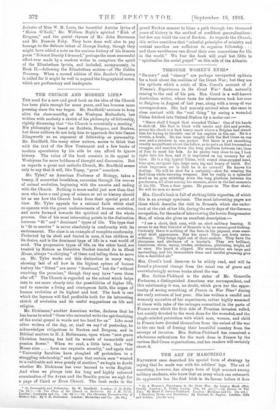THROUGH WOMEN'S EYES.*
" BRIGHT " and "cheery" are perhaps unexpected epithets for a book about the realities of the Great War ; but they are the epithets which a critic of Mrs. Creed's account of A Woman's Experiences in the Great Wartfinds naturally coming to the end of his pen. Mrs. Creed is a well-known Australian writer, whose taste for adventures took her over to Belgium in August of last year, along with a troop of war correspondents. She had scarcely arrived when she came in close contact with the "real thing " by seeing a wounded Uhlan fetched into Ostend Station by a motor-car:— " Never shall I forgot that wounded Uhlan! One of his hands is shot off. His face is black with smoke and dirt and powder, across his cheek is a dark heavy mark where a Belgian had struck him for trying to throttle one of his captors in the ear. He is a wretch, a brute.. He has been caught with the Red Cross on one arm and a revolver in one pocket. But there is yet something cruelly magnificent about the follow, as he puts on that tremendous swagger, and marches down the long platform between two lines of foes to meet his fate. As ho passes very close to me, I look right into his face, and it is imprinted on my memory for all time. He is a big, typical Uhlan, with round close-cropped head, blue eyes, arrogant lips, large ears, big and heavy of build. But what impresses mo is that ho is no coward ! He knows his destiny. He will be shot for a certainty—shot for wearing the Red Cross while carrying weapons. But he really is a splendid devil as he goes strutting down the long platform between the gendarmes, all alone among his enemies, alone in the last moments of his life.. Then a door opens. Ho passes in. The door auto. He will be seen no morel"
Mrs. Creed's book is full of striking little vignettes, of which this is an average specimen. The moat interesting pages are those which describe the visit to Brussels which she under- took at the risk of her life, during the early days of the German occupation, for the sake of interviewing the heroin Burgomaster Max, of whom she gives an excellent description :—
"I see a short, dark man, with an alert military bearing. It seems to me that this idol of Brussels is by no means good-looking. Certainly there is nothing of the hero in his piquant, even some- what droll appearance. But his eyes! They are truly extra- ordinary. They bulge right out of their sockets. They have the sharpness and alertness of a terrier's. They are brilliant, humorous, stern, merry, tender, audacious, glistening, bright, all at once.. His beard is clipped. His moustaches are large and upstanding, and his immaculate dress and careful grooming give him a dandified air."
Mrs. Creed's book deserves to be widely read, and will be found a pleasant change from the usual run of grave and overwhelmingly serious books about the war.
Mrs. Sutton-Pickhard is the sister of Mr. Granville Forteseue, a distinguished American war correspondent, and this relationship it was, no doubt, which gave her the oppor- tunity of seeing something of France in War Time' during the early autumn of last year. She has written a candid and womanly narrative of her experiences, rather highly seasoned at times with tales of the outrages committed in the parte of
France over which the first tide of Prussian invasion rolled, but mainly devoted to the work done for the wounded, and the single-minded patriotism with which man, woman, and child in France have devoted themselves from the outset of the war to the one task of freeing their beautiful country from the scourge of invasion. Mrs. Sutton-Pick hard has conceived a wholesome enthusiasm for the work done in France by the various Red Cross organizations, and her readers will certainly share it.


































 Previous page
Previous page